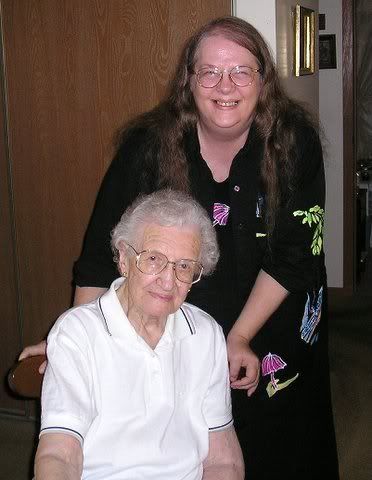Just for V ... Our first paper he didn't need to remind us to do. :)
Topic: u01d2 Scientific Discipline Date: July 15, 2006 5:54 PMSubject: In response to assignment from Ann Author: Garvey, Ann
The article I chose to focus on was “Big-Fish-Little-Pond Effect on Academic Self-Concept: A Cross-Cultural (26-Country) Test of the Negative Effects of Academically Selective Schools” by Marsh and Hau (2003). In answering the questions, “Is social psychology a scientific discipline?” And, “What makes it a scientific discipline?” I would answer affirmatively to the former especially due to social psychology’s primary interest in the scientific method and experimentation combined with attention to social consciousness and the social self (Morawski, 2000). In response to the latter, I would suggest that the system of testing hypothesis empirically allows us to build an objective and methodological knowledge-base that is very scientific. The development of social psychology following a pattern of hypothesis testing has been challenged by psychologists from other countries and by a few American psychologists, such as Wallach and Wallach . Those positions will be sketched shortly, but distinguished attention will be in response to the work of Marsh and Hau, which will illustrate the generalizability of empirical studies based on large multi-cultural samples. Last, we will summarize the effect on this particular study on the area of learning we are interested in toward adults with developmental disabilities.
The study of “Big-Fish-Little-Pond Effect” (BFLPE) by Marsh and Hau was performed utilizing 103,558 15-year-olds from 26 countries to test the hypothesis of selective schools (private) in comparison to non-selective schools (public) as they relate to building “academic self-concepts” in adolescents. The study found that students in the selective schools did not fare as well in academic self-concepts as the students in public schools. This was measured by a self-concept instrument and achievement tests (Marsh and Hau, 2003). Marsh and Hau considered self-concept as “making things happen” such as positive thoughts and feelings leading to the students’ ability to make choices, self-motivate, plan and other subsequent accomplishments (2003) and that students with higher self-concepts could adapt to change better. The social comparison aspect contributes to theory development in that it assists individuals in forming a frame of reference as to where they stand in comparison to others in similar situations. In a sense, students compare themselves to other students and this assists them in developing a self-concept. In consideration of selective schools, these students were considered more likely to be small fish in a big pond thus making it to the “top of the class” more difficult, thus lowering self-concept. Therefore in public schools, students are bigger fish in a smaller pond comparing themselves upward toward higher feelings of self-concept because often the competition for intellectualism isn’t as great.
Research such as that of Marsh and Hau is unique in that it is a very comprehensive study undertaken in many different countries. It follows the American model of Empirical research, but it does not over-generalize the American role as center of the research effort or results. In the world view America could be compared to private education, we are a “selective” country. We are in general highly educated and America is the place that is supposed to value most happiness, success, rights, and freedom. But, if Americans take the stand as only maintaining a narrow self-concept, we then risk our self-concept as being unrealistic; there is a larger pond. If we only protect are own, we can only assume a self-view as an illusion that we are big fish. Social psychology in America mimics this view of being big fish in a small pond. “Our history” is identified with American “scientific management in the 1920s, the emergence of social psychology in the 1930s, World War II, group dynamics in the 1950s, social action of the 1960s, team building in the 1970s, economic turmoil in the 1980s, and the ascendance of team-based organizations in the 1990s" (Skipton & Freedman, 2000). Global relationships have seriously hit psychology in only the past decade or two. It is easy to draw a parallel that a larger pond would incorporate the entire world, and in this pond the United States is relatively a small though important fish. This practitioner’s understanding of the world population is that American’s are only 4% of the whole. America seems to have a self-concept that suggests that it is better or “more right” than most other countries, because of its narrow focuses and influences primarily due its positions of power, wealth, and education.
In retrospect, we might look into the value of self-concepts drawn by Marsh and Hau. In the formation of an American identity in the 21rst century, we could generalize that a better self-concept would lead to better chances of “making things happen in the world.” Marsh and Hau contend that having a positive frame of reference leads to better social comparison and a higher self-concept. The self-concept that America holds for itself is most likely higher within itself (big fish small pond) and more positive than concepts held of it within the world’s view. Taken from the world’s view, America is making things happen such as war, which is not in concordance with collaborative efforts in world peace. The United States stood apart from the world community in its war against Iraq when it quit its negotiations with the United Nations. Many American people supported the present administration, because they hold the frame of reference that we are the world’s leader and in particular - watchdogs in preventing international abuses of power against people, such as the case in Iraq. America is trying to impose its ideals of democracy on a resistant international community.
As tides change, it now seems that America is holding the self-concept that it is in danger. This has been apparent since the bombing of the World Trade Center. Through its concept of danger, America has taken a strong stance for its self protection, especially because it is easily recognized that more people are “against” the US than before. It started through terrorism, and over the last three years we have the building of Homeland Security, sufferance priori (high gas prices or shortages), and the enactment of stricter policies and procedures with foreigners, illegal aliens, border crossings, and less tolerance for foreign languages. America seems to be shutting the fortress doors, at the sake of losing touch with the international intelligence community that in the past has served a check and balance purpose against another world war. This practitioner percept is that we as a country are only representing a façade in its role of world leadership. We will accomplish less, because most often people do not favor war for their sons and daughters, and taking a stance of war will not allow us to make better choices, motivate others, or plan toward peace. Like the 15 year-old students, we may find that being in a selective school/country the competition to maintain higher status within the world is more difficult, because in reality there are too many factors not within our control.
Social psychologists play a great part in foreseeing events happening due to its understanding of society and the way it works. The importance of the scientific method is underscored by Brehm, Kassin & Fein (2005) who state:
[Indent] Social psychologists develop specific, quantifiable hypotheses that can be tested empirically. If these hypotheses are wrong, they can be proven wrong. In addition, social scientists report the details of how they conduct their tests so that others can try to replicate their findings. They integrate evidence from across time and place. And slowly but steadily, they build a consistent and more precise understanding of human nature [end indent].
As outlined in the first assignment, we can know that an American interest in social psychology was sparked approximately 125 years ago and that it was thought to be the formal beginning of social psychology because at that time social interest was combined with a scientific method. Morawski (2000) writes "America's dual interest in social welfare and practical science fueled the emergence of social psychology in the late 19th century. French researchers at the beginning of the 21rst century complain of the world being overly enamored in the scientific discipline of psychology. Rodriguez and Alcover de la Hera (2002) state “It is necessary to point out its [United States] excessive dependency in both theory and methodology on models and tools” and its focus on limited populations. This resulted in their conclusion that there be a European curriculum where European psychologists could complete its own research and Rodriguez and Alcover de la Hera (2002) further state advancements had been made over the last 15 years in structuring social psychology into the European university setting (2002).
Part of the fall-out from the perspective of Rodriguez and Alcover de la Hera might have come from Americans’ 20th century insistence on studying primarily middle-class White males from the United States. It has only been a recent development through globalization that psychology as a whole incorporated multi-cultural standards. These standards seem dampened by an America military role in the Middle East. America, could do itself further harm if it assumed its concepts without affirmation of global truths, which will become more difficult if the country is allowed to shut it’s front door.
It would seem fair to present the field of social psychology as a developing structure and to note each year and century that it has made improvements upon itself that are in accordance to time and space in serving people. Morawski (2000) indicates a need for the psychology profession to produce knowledge that could be readily used to address current social problems and regulate social institutions.” There is a question as to America becoming inclusive within its self. An important aspect of social psychology has always been in its immediate application. The solutions it develops need to be put into practice and developed to work for all people. While most people have never afforded the luxury of personal and private counseling, social psychology could benefit many in its generalization of knowledge and truth within society. It should be noted also the specific work being done in social psychology on groups could be conceivably very supportive and practical.
As mentioned at the beginning of this writing effort, not all American social psychologists hold the belief that the scientific method is working. Wallach and Wallach (as cited in Schaller, Crandall, Stangor & Neuberg, 1994) discussed hypotheses and empirical design on experiments offering “some provocative opinions about what makes a hypothesis interesting, important, or worthwhile to test. They argued that in social psychology, “hypotheses derivable from propositions very much like tautologies may not be infrequent” and that “their confirmation as such is of little interest” (Abstract; see also p. 241)" (Schaller, Crandall, Stangor & Neuberg, 1994). Corsini (2002) states that tautology is the “repetition of the same word or phrase, or of a literal equivalent in the same sentence.” So, basically the argument of Wallach and Wallach was that too frequently social psychology wastes research effort by studying words so close in nature they lose value in describing something unique or of interest. Schaller, Crandall, Stangor & Neuberg state that social psychology and general science will benefit best from “an unrestrictive, eclectic, even anarchic approach to the generation of ideas and hypotheses.”
Finally, this practitioner would like to state that further research of social comparison and self-concept would be of interest in pursuit of new knowledge and toward application of the information to current or future professional settings. As stated previously, Marsh and Hau (2003) considered self-concept as important in “making things happen. We have an obvious interest in world politics only in respect to wanting the world to be around in our life and the life of our family. It seems socially that our country is making wrong turns, but that there is good work being done by researchers who can consider the significance of world-wide theories. One interesting note that Marsh and Hau made in relationship to people with developmental disabilities was that just as selective schools didn’t work for the higher educated students, teaching students with developmental disabilities at higher levels (regular classrooms) also did not work toward providing positive self-concepts. Although, advocacy strongly suggests normalization and inclusion, the reports suggest that placing people with developmental disabilities in the classroom was taking them as big fish in a small pond, and making them into small fish in a big pond. This is something to consider in our work and we incorporate social psychology into our thoughts. As an up and coming educational psychologist, we feel the study of positive self-concepts that allow for motivation, choice-making, planning, etc. will support the work we’ve already started in self-regulation. It is my contention that when people, or countries, are in control of self, the outcome will be brighter for all.
References
Brehm, S. S. Kassin, S. & Fein, S. (2005). Social psychology. Boston: Houghton Mifflin.
Corsini, R. J. (2002). The dictionary of psychology. NY: Brunner-Routledge.
Marsh, H. W. Hau, K. (2003). Big-fish-little-pond effect on academic self-concept: A cross-cultural (26-country) test of the negative effects of academically selective schools. American Psychologist, 58, 364-376. Abstract retrieved July 13, 2006 from EBSCOhost database.
Morawski, J. G. (2000). Social psychology a century ago. American Psychological Association, 55, 427-430. Abstract retrieved July 13, 2006 from EBSCOhost database.
Rodriguez, F. G. & Alcover de la Hera, C. M. (2002, December). Small group research in Europe: contributions to the field from Spanish social psychology 1955-2000. European Psychologist, 7, 265-274. Abstract retrieved July 13, 2006 from EBSCOhost database.
Schaller, M., Cradall, C. S., Stangor, C., & Neuberg, S. L. (1995). "What kinds of social psychology experiments are of value to perform?": Comment on Walach and Wallach (1994). Journal of Personality and Social Psychology, 69, 611-618. Abstract retrieved July 13, 2006 from EBSCOhost database.
Skipton. L. H. (2000). From scientific management through fun and games to high-performing teams: A historical perspective on consulting to team-based organizations. Consulting Psychology Journal: Practice and Research, 52, 3-19. Abstract retrieved July 13, 2006 from EBSCOhost database.
I think this recording is only about 30 minutes, but of course, you can take a pass ... just recording *silly grin*
















